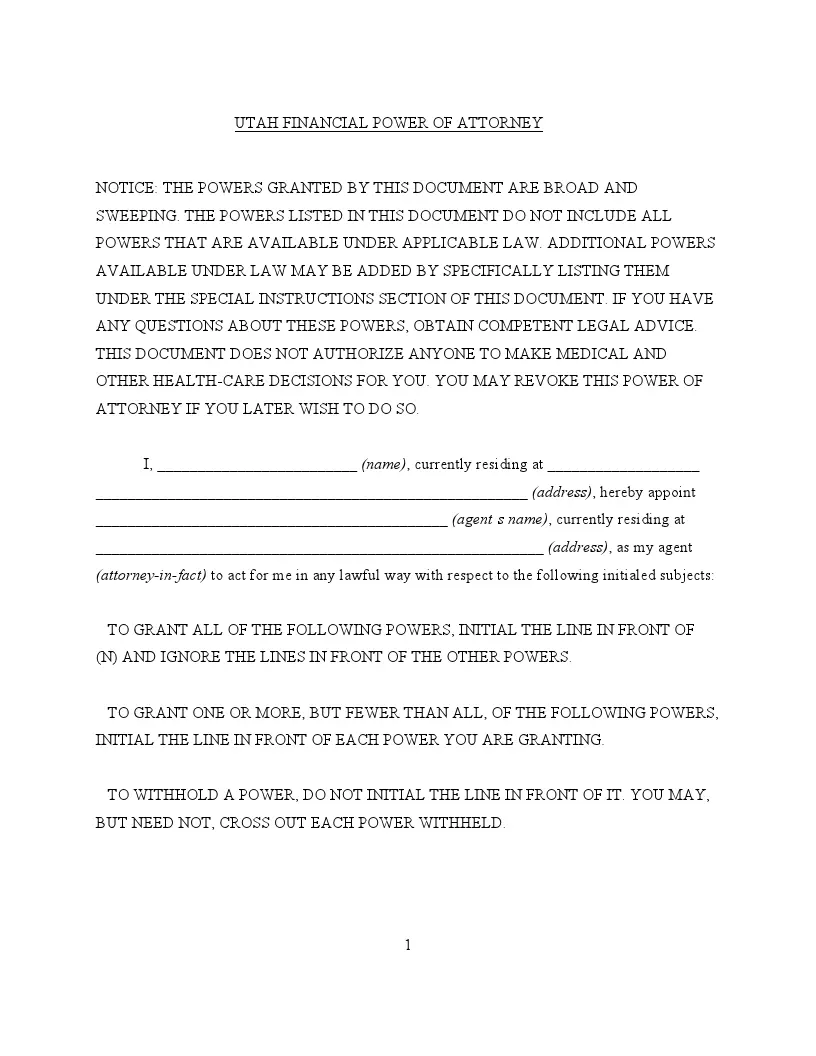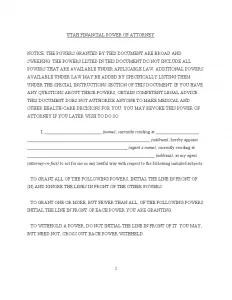Utah General Financial Power of Attorney Form
The Utah general financial power of attorney is a legal form by which an individual (referred to as the “principal”) designates someone else (referred to as the “agent” or “attorney-in-fact”) to manage their financial affairs. This POA form gives the agent broad powers, including overseeing bank accounts, signing checks, buying or selling property, and conducting other transactions on behalf of the principal.
The powers granted by this power of attorney in Utah will remain in effect unless the document specifies a termination date or the principal revokes it. However, it does not remain effective if the principal becomes incapacitated. Use a durable form if you need a power of attorney that remains in effect after the principal’s incapacity.

Build Your Document
Answer a few simple questions to make your document in minutes
Save and Print
Save progress and finish on any device, download and print anytime
Sign and Use
Your valid, lawyer-approved document is ready
The general power of attorney in this jurisdiction is governed by Sections 75-9-101 to 75-9-403 of the Utah Code. This legal framework ensures that an agent, once granted power, receives the authority to perform any act that the principal can do themselves. This encompasses a broad range of activities detailed from Sections 75-9-204 to 75-9-216, including but not limited to:
- Financial management.
- Real estate transactions.
- Handling of personal property.
The authority granted can be applied to assets the principal currently holds or acquires in the future, irrespective of the asset’s location. This flexibility is important for principals with holdings in multiple states or acquiring new assets after the document is executed.
Moreover, for a general power of attorney to be legally binding in Utah, it must meet specific signing requirements. Section 75-9-105) requires the presence and certification of a licensed notary during the signing process, ensuring the document’s validity and enforceability. This procedural step is critical to prevent fraud and confirm the principal’s intent when signing.
Utah General Power of Attorney Form Details
| Document Name | Utah General Power of Attorney Form |
| Other Name | Utah Financial Power of Attorney |
| Relevant Laws | Utah Code, Title 75, Chapter 9 |
| Avg. Time to Fill Out | 10 minutes |
| # of Fillable Fields | 41 |
| Available Formats | Adobe PDF |
Filling Out Utah General (Financial) POA Form
This document needs careful attention to ensure that all information is accurate and reflective of your intentions. Here’s a step-by-step guide to help you correctly complete general financial power of attorney in Utah.
1. Identification of the Principal and Agent
Provide the full legal names and complete addresses of the principal (you) and the agent (the person you appoint). This section establishes the parties’ identities and roles in the general power of attorney.
2. Grant of Powers
Specify the powers you are granting to your agent. It includes decisions regarding banking, real estate, investments, and other financial transactions. It’s essential to be clear and precise about what your agent is authorized to do on your behalf to avoid any ambiguity or misuse of the power granted.
3. Special Instructions
If you want to impose specific limitations or conditions on the agent’s powers, detail these instructions in this section. It might include restrictions on selling specific properties or stipulating that the agent must provide regular accounting to another party.
4. Signing Requirements
Ensure that the document’s signing complies with Tennessee state laws, which require the presence of a licensed notary during the signing. The principal and the agent must sign the document in the notary’s presence to ensure its legality and enforceability.
5. Notarization
After the principal and the agent have signed the general power of attorney, the notary will fill out their section. This includes certifying the identities of the signatories, witnessing the signing, and applying their notarial seal.
6. Safe Storage and Copies
Once notarized, store the original document securely, such as in a safe deposit box or with an attorney. Provide copies to your agent and any institutions or individuals who will interact with the agent under this power of attorney, such as banks and financial advisors.
7. Revocation and Amendments
You can revoke or amend this power of attorney anytime as long as you are competent. To do this, you should provide written notice to your agent and any entities using this document. Creating a new general power of attorney automatically revokes the old one unless stated otherwise.
